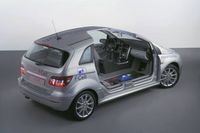Mercedes-Benz Further Advances Hydrogen-Operated Fuel Cell Technology
STUTTGART – July 24, 2008: Daimler AG has converted the first vehicles of its existing fuel cell fleet from 350 to 700-bar technology. With this more highly compressed hydrogen, the operating range of these vehicles can now be extended by up to 70 percent.
The first practical test for an A-Class F-CELL “plus” featuring this technology was a journey from Berlin, Germany’s capital city, to the Magdeburg environmental forum; the vehicle thus demonstrated its suitability for everyday operation.
With around 270 kilometres - compared to the original 160 - per tank filling, the new 700-bar technology is already extending the operating range in the current vehicle generation by up to 70 percent.
The B-Class F-CELL, to be produced in a small series as of 2010, will even boast a range of about 400 kilometres.
“These fuel cell vehicles can travel as far as automobiles with an internal combustion engine and are thus entirely suitable for everyday operation,” said Prof. Dr. Herbert Kohler, Vice President Group Research and Advanced Engineering, responsible for Body and Powertrain at Daimler AG.
B-Class F-CELL - the next generation
The new generation of
fuel cell drive is far more compact and, more efficient, and ideally suited
to everyday use. The technological basis of this development is the
optimized fuel cell system first presented by Mercedes-Benz in its F 600
HYGENIUS research vehicle, which debuted in 2005. This highly compact unit
operates much more efficiently than the fuel cells from the previous
generations. The newly-designed stack module is around 40 percent smaller,
but develops 30 percent more power output and cuts fuel consumption by 16
percent.
The system also has favourable cold-starting ability. This is made possible by innovations such as the electric turbocharger for air supply and the new humidification /dehumidification system.
The electric motor develops a peak output of 100 kW and a maximum torque of 320 Newton metres. The B-Class F-CELL thus exceeds the driving dynamics traditionally expected from a two-litre petrol-powered car.
The emission-free fuel cell drive system of this compact family car has a diesel-equivalent consumption rating of only 2.9 litres of fuel per 100 kilometres.
With some 4 million emission-free kilometres covered by its fuel cell fleet, Daimler AG has more data, expertise and experience at its disposal than any other manufacturer when it comes to the development of this advanced eco-friendly propulsion technology. Boasting around 100 such test vehicles, the company operates the world’s largest fuel cell fleet, comprised of concept vehicles, passenger cars, vans, and Citaro city buses, all of which are currently undergoing trials with customers in everyday operation.



